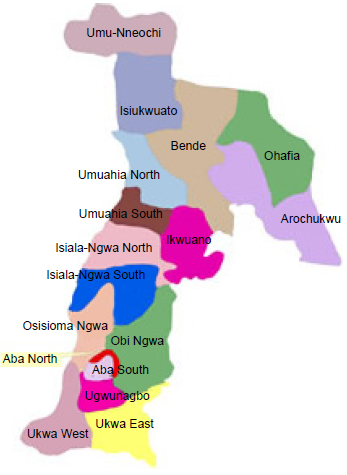Abia State, south-east Nigeria has received approval for a $240 million multilateral agency loan to enable it tackle major road rehabilitation, provide erosion control infrastructure, and solid waste management facilities in Umuahia, the state capital, as well as in Aba, the commercial hub.
While the project is estimated to cost $263.80 million, external funding is put at US$240 million, the state government will provide the balance of $23.80 million in counterpart funding for compensation to people affected by the project and implementation of a Resettlement Action Plan.
The projects are expected to help the state fix serious infrastructure challenges arising from decades of underinvestment amidst rapid urbanization currently facing Umuahia and Aba with estimated population of 553,000 and 814,000 respectively (2022 estimates).
The situation of both cities, the statement noted, is aggravated by gully erosion and the emergence of huge piles of solid waste on the roads, the statement noted.
A breakdown of the external funding plan shows that African Development Bank Group (AfDB) is offering a loan of $100 million; in addition to a Canada–African Development Bank Climate Fund (CACF) loan of $15 million; and a $125 million co-financing loan from the Islamic Development Bank.
According to a statement by the AfDB on Sunday evening, under the project scheduled for completion in 2029, a total of 248.46 km of road – 58.03 km of roads in Umuahia and 190.43 km of roads in Aba – will be rehabilitated to asphaltic concrete standards at varying cross sections.
Also, “erosion sites in Umuahia and Aba will be reinstated as well as preparatory studies undertaken for private sector participation in solid waste management for the two cities. The project will also include capacity building, project management and development of social infrastructure such as the rehabilitation of schools and the provision of sanitation facilities in schools, community markets and hospitals.”
When completed, the 1.37 million population in these two cities will benefit from reduced travel time, vehicle operating costs and lower transport cost, even as the project will create an estimated 3,000 temporary jobs (30% for women) at the construction phase, and about 1,000 permanent jobs during the operational phase.
The permanent jobs, it is anticipated, will particularly benefit the youth, who will make up 50% of the project, and will be trained in contract management by the State Youth Road Maintenance Corps for road maintenance, comprising young engineers drawn from the 17 Local Government Areas of the State.
The statement quoted Lamin Barrow, Director-General of AfDB’s Nigeria Country Department, as saying the project will build resilience by providing the towns with access to urban infrastructure services, including economic and social amenities.
“The results from implementation of the project will help expand access to economic and social amenities in the two cities, and thereby contribute to building sustainable and liveable cities,” he stressed.
This is also expected to increase AfDB’s portfolio in Nigeria, comprising 48 operations worth $4.2 billion, with national (Federal and States) operations accounting for 90%, comprising 41 projects amounting to $3.79bn, while multinational operations constitute 10% for 7 projects amounting to $0.41bn. Also, the statement continued, there are 24 Sovereign Operations ($2.36 billion or 56% of total commitments) and 24 Non-Sovereign Operations ($1.84 billion or 44%).
Trending Today
Menu








